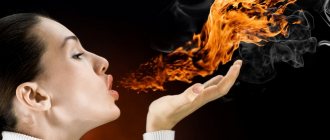Why is it so difficult for many people to quit smoking? The fact is that the addiction caused by smoking cigarettes is akin to a drug addiction, since addiction occurs at the physical level. Nicotine, which is part of tobacco, is included in the metabolism of a smoker. This is why it is so difficult to quit smoking without the help of specialists - for some time after getting rid of a bad habit, the body is rebuilt. And this manifests itself not only in positive, but also in negative aspects.
It is best to know in advance what happens to the body after quitting smoking in order to be prepared for these manifestations. Remember: your decision to quit smoking will help improve your health and improve your overall quality of life.
Negative aspects of quitting smoking
As we have already said, after quitting smoking, the body begins to rebuild its metabolism. As a result, the former smoker begins to experience a number of unpleasant symptoms. Fortunately, this only lasts for the first months, and after the metabolism normalizes, everything returns to normal.
Among the negative manifestations:
- emotional imbalance: tearfulness, irritability, aggressiveness, depressed mood;
- sleep disorders: insomnia, restless sleep, nightmares;
- susceptibility to colds due to a temporary decrease in immunity;
- unpleasant taste in the mouth after quitting smoking, associated with liver recovery;
- headaches, dizziness;
- weight gain, because against the background of emotional discord and the need to do something to drown out the craving for cigarettes, the former smoker begins to eat more.
Other options for dealing with nicotine withdrawal
To relieve withdrawal symptoms when quitting smoking, use:
- Use of special pharmaceuticals. These are the drugs that have a mild nicotine-replacement effect, as well as antidepressants and substances that provoke aversion from smoking. These include tablets: “Tabex”, “Lobelin”, “Cytisine”, “Champix”, “Corrida Plus”, “Zyban”, “Brisantine” and others.
- The right diet. The diet should consist of light, fortified dishes rich in minerals. For example - salads, fruits, vegetable purees. You should drink more fluid. It speeds up the body's detoxification process.
- Psychological relief. It is important to occupy yourself with something that distracts you from suffering. This could be active recreation, playing with children. any impressions that could overshadow the psychological discomfort experienced.
Don’t forget: nicotine withdrawal is an extremely difficult condition for the entire body. Don't take it lightly. Better consult a narcologist!
The text was checked by medical experts: Head of the socio-psychological service of the Alkoklinik MC, psychiatrist-narcologist L.A. Serova.
CAN'T FIND THE ANSWER?
Consult a specialist
Or call: +7 (495) 798-30-80
Call! We work around the clock!
The first 14 days without cigarettes
The body's response to quitting smoking is most intense in the first two weeks after quitting tobacco. All symptoms that appear at this time are a consequence of the so-called nicotine fasting: the body is cleansed of nicotine, but the processes in which nicotine participated have not yet been rebuilt.
We will describe in detail, day by day, below the emotional and physical manifestations that will accompany quitting smoking, and the changes in the body at this time.
Then the symptoms will no longer change daily. A former smoker gets used to the normal state, and the changes will not be as bright and noticeable as in the first days. Therefore, further we will describe the consequences of quitting nicotine on a monthly basis.
First day
At the beginning of the journey, a person who is trying to quit a bad habit feels an emotional uplift, is determined to get rid of the addiction and is confident in future success. Against this background, the craving for nicotine is absent or easily blocked by willpower and distraction by other things.
The carbon monoxide content in the blood gradually decreases and, on the contrary, the oxygen content increases. A person feels that it has become easier to breathe; an excess of oxygen can even cause slight dizziness. For many experienced smokers, this ease of breathing becomes a revelation.
Some experience a decrease in appetite, weakness, and slight anxiety. You may have difficulty falling asleep or have trouble staying asleep.
Quite often it is recommended to keep a diary to record all stages of the addiction recovery process.
Second day
Symptoms of nicotine starvation begin. A severe cough and shortness of breath appear.
The ciliated epithelium of the lungs begins to restore its functions. Sputum production is reduced. The inflamed intestinal mucosa begins to regenerate. Appetite decreases, and mild abdominal pain may occur. There may be an increased urge to urinate.
There is almost no change in the psychological state. The person is still on the rise, but slight irritability appears, which is quite easy to suppress with an effort of will. Self-hypnosis techniques help, constant reminders to yourself why the decision was made to quit (recovery).
Sleep is often restless; nervousness and obsessive thoughts can cause problems falling asleep. You may feel drowsy during the day.
The third day
The tone of blood vessels increases, blood supply to the heart and brain improves. Regeneration of the bronchial mucosa begins, normalization of the pancreas.
The physical craving for cigarettes decreases slightly. While these changes are invisible, they occur at the cellular level.
The skin becomes dry, begins to peel, and small pimples (dry) may form.
Appetite increases, cravings for sweets appear (or intensify). Heartburn may bother you.
Some people experience tinnitus, dizziness, and a feeling that their heart is “squeezing.” Symptoms of psychological dependence intensify. A former smoker becomes more and more nervous, it is difficult for him to concentrate on anything, his thoughts always return to the cigarette.
Fourth
By this time, dizziness usually goes away, and the blood supply to the brain normalizes. But I still have concerns about tinnitus and surges in blood pressure. The face and fingers may swell.
Cough continues; Often a person has the feeling that there is a viscous mucous lump in the throat - the latter means that a restructuring of the system for producing bronchial secretions is taking place in the bronchi.
Emotionally, aggressiveness decreases and depression goes away. Many patients at this stage say that they expected more serious manifestations of nicotine withdrawal.
The sleep is still disturbing and superficial. Increased appetite and cravings for certain foods persist.
Fifth
Regeneration of the respiratory system continues, normalization of the functionality of the bronchi and lungs. But you still feel a lump in your throat, and dark mucus may come out when you cough
By this time, little remains of the emotional high of the first day. There is a risk of breakdown, which is further facilitated by deteriorating health. It is important to remember that all quitters experience this, and many quite successfully.
Small microcracks begin to disappear from the surface of the tongue. The perception of taste is restored.
Sixth
The functioning of the stomach and pancreas continues to normalize. Increased thirst often appears, and with it frequent urination. Some people experience bitterness in the mouth and painful sensations in the liver area. Appetite is reduced.
Many people note sweating, dry mouth, trembling hands, and nausea during this period.
Those who quit smoking become nervous, aggressive, and sometimes whiny. Every little thing causes an emotional reaction, and self-control decreases. You can consult your doctor and start taking anti-anxiety medications.
Seventh
The body is rebuilding to work without nicotine, although mucus continues to be released when coughing, and the feeling of a lump in the throat has not yet gone away. There may be occasional bowel movements. Fatty foods are poorly accepted (heartburn may occur), but overall appetite increases. The skin remains dry and flaky.
“Cigarette syndrome” and other provoking situations.
Tenth
Internal motivation is falling, so now those who quit smoking really need the support and encouragement of loved ones and those around them. A person can hardly tolerate people smoking nearby.
The restoration of the immune system begins. The cough continues. If light yellow or gray clots come out during a cough, you should definitely contact an otolaryngologist. A cough can be softened with a warm drink.
Eleventh
More oxygen enters the body, which can cause dizziness, trembling of fingers, and headaches.
Emotional sensitivity, temper, or vulnerability for any reason persists.
There is a desire to test yourself by smoking “just one cigarette” and remember its taste. At the same time, the smell of tobacco smoke is disgusting.
Appetite is still increased.
Twelfth
The condition of the skin improves, largely due to the normalization of blood circulation. A healthy complexion returns.
The cough softens, and chronic inflammation in the lungs gradually disappears. Intestinal functions are restored.
The neuropsychic state has not yet improved, which means that the person still greatly needs the support of loved ones.
Thirteenth
Malaise of uncertain localization may occur, a feeling of heaviness in the back of the head, and weakness may appear. There are surges in blood pressure.
Usually during this period a person strives to reach the two-week mark, so the risk of relapse is not very high - the desire to take a cigarette is suppressed by this desire.
Fourteenth
The cough begins to subside, the complexion continues to improve, and the yellow coloring of the fingers goes away. Vegetative-vascular disorders may still be present - lethargy, drowsiness, weakness.
Two weeks is the first serious milestone, and it is psychologically important not to break down on this day. A common mistake is to assume that one cigarette after 14 days of abstinence will not harm. In fact, it can derail the entire smoking cessation process.
Possible consequences
The problem “I quit smoking and got heartburn” can have a variety of consequences: from discomfort and weight loss to the development of a tumor process in the body, so you should think about your health if:
- heartburn occurs after every meal and does not go away for several days - such symptoms are typical for exacerbation of gastritis or ulcers. If this is accompanied by pain in the stomach, you should definitely visit a gastroenterologist and make sure that while quitting nicotine there is no exacerbation of any disease;
- very severe heartburn, pain, blood clots or impurities when coughing or in vomit, severe weakness and weight loss - this may indicate the onset of a tumor process in the digestive organs;
- there was a sharp jump in weight - if severe heartburn prevents you from eating normally, this can lead to a decrease in the amount of food consumed and to exhaustion of the body;
- craving for a cigarette again - one of the most dangerous consequences for a former smoker is to start smoking again; the mucous membranes of the stomach may simply not be able to withstand a repeated attack by nicotine.
Changes in the first month after quitting smoking
Let's see how the body recovers after quitting smoking in the second half of the first month.
Feel. Those who quit smoking are still bothered by dizziness, headaches, and blood pressure surges - the brain now receives more oxygen and has not yet adapted to this. The cough with sputum production becomes weaker towards the end of the month. The perception of smells and tastes of food is normalized - for someone quitting smoking, this is felt as a sharpening of the senses of smell and taste, since they were previously dulled. Weight gain is possible due to improved appetite. Since the regeneration of the gastrointestinal mucosa is still ongoing, abdominal pain, constipation, and diarrhea may still bother you.
Changes in the body. The body is restored at the cellular level, harmful substances, for example, products of the processing of nicotine tar, are intensively removed. Feeling better. Regeneration of the bronchial mucosa occurs.
Blood cells are renewed: leukocytes - faster, red blood cells - slower. Vascular tone increases. This improves immunity and tissue nutrition. The yellowness from the fingers continues to disappear, and the complexion improves.
Psycho-emotional state. Aggression and irritability are less than in the first days. Psychological dependence on smoking still persists, and symptoms of “breathing deep” syndrome are present. Normal functioning of the stomach and intestines was restored. Liver regeneration begins (from 5 months).
Psycho-emotional sphere. The mood is cheerful and stable. Sleep is normalized. The craving for cigarettes is easily suppressed, because at this point it represents only a slight desire to return to a familiar ritual. A person develops other habits with which he replaces the ritual of smoking. But breakdowns are still possible under provoking circumstances.
Possible reasons
When heartburn occurs regularly, the causes are often related to the negative effects of nicotine on the digestive system.
It has been scientifically proven that smokers activate the production of hydrochloric acid, increasing the average level of acidity of gastric juice, causing an unpleasant burning sensation. In addition, salivation is impaired in the oral cavity, which has a slightly alkaline environment that can neutralize the effect of acid. At the same time, tobacco smoke entering the esophagus causes irritation and microburns of the mucous membrane, which aggravates the situation. The picture is completed by a gradual weakening of the strength of the muscular sphincter located in the lower part of the esophagus, which prevents the release of gastric juice and food back into the esophagus.
As a result, a whole complex of factors is formed that predispose smokers to heartburn.
Second six months
In the seventh and eighth months after quitting smoking:
- the restoration of olfactory receptors continues, so the former smoker discovers more and more new shades of smells and tastes;
- cough becomes rare, as the regeneration of cells of the respiratory system is in full swing. Lung capacity increases even more. The hoarseness of the voice goes away as the vocal cords are restored;
- the yellow plaque of a smoker gradually disappears from the teeth;
- liver cell restoration continues;
- the psycho-emotional state is still stable and cheerful.
Ninth month
This is a month of crisis, in which you need to be especially careful not to break down. On the one hand, the habit of smoking has not yet been completely destroyed, on the other hand, the person has already forgotten all the negative aspects of smoking, has become accustomed to feeling good, and he has the illusion that nothing bad happened.
Tenth month
During this period, patients often have realistic dreams that they are smoking again, and this leaves a painful feeling upon awakening.
Eleventh month
Thoughts about smoking come very rarely and are easily dismissed by the mind as something unnecessary. Psychological dependence has almost completely disappeared.
What happens in the body
An increase in the synthesis of hydrochloric acid in the stomach leads to irritation of its walls. This is aggravated by a deterioration in the blood supply to the stomach and slower regeneration of the mucous membrane, which leads to the appearance of a number of concomitant diseases.
A decrease in salivation in the oral cavity leads to drying out of the esophagus and oral cavity, which are additionally burned by tobacco smoke. This causes a feeling of discomfort and a deterioration in the quality of preliminary wetting of food with saliva, which is necessary for its quality digestion. Insufficient food wetting further irritates the walls of the stomach and causes a number of concomitant diseases.
Poor closure of the sphincter that separates the esophagus from the stomach contributes to the release of excess gastric juice into the esophagus, which becomes the main cause of heartburn from smoking.
One year after quitting smoking
A year without cigarettes is a serious achievement. During this period, the body usually recovers so much that the risk of stroke (by 30%), heart attack (by 50%) and the likelihood of lung and liver cancer (by 80-90%) is reduced. Women who have become pregnant by this point do not have to worry about the risk of miscarriage - its probability is almost the same as for non-smokers.
The risk of relapse is minimal, but it is worth remembering what you went through to get to this point. It is not worth risking such an achievement for the sake of one cigarette.
Nutrient disturbances due to smoking
Now let's look at the nutritional imbalances that occur when smoking:
- The total energy requirement changes during the day, it increases by an average of 100 kcal. This calorie content is necessary to neutralize the toxins present in tobacco.
- The need for vitamins A, E, C and carotenoids as the basis of the body’s antioxidant defense increases. Oxidative stress, caused by oxygen free radicals and lipid peroxides, plays an important role in carcinogenesis. Due to the increased risk of developing cancer of any location in smokers and increased consumption of vitamins, they need larger amounts of antioxidants than non-smokers.
- The need for vitamin D increases; it is necessary for the regulation of phosphorus-calcium metabolism and plays an important role in maintaining bone health. Components of tobacco smoke block the synthesis of some vitamin D metabolites. In combination with other negative effects on bone tissue, this contributes to the development of osteopenic conditions.
- Calcium metabolism is disrupted and bone density decreases. There is compelling evidence that women who smoke are more likely to have bone fractures than non-smokers. It is known that bone tissue containing estrogen receptors is highly sensitive to this hormone. Estrogens inhibit bone resorption, while ingredients in tobacco smoke not only increase it, but also suppress bone synthesis. Osteoporosis is more common in women who smoke and have not received postmenopausal hormone replacement therapy. Along with estrogen deficiency, calcitonin resistance and impaired vitamin D metabolism, characteristic of women who smoke, contribute to a decrease in bone mineral density.
Some chemical elements that make up tobacco smoke are calcium antagonists and can enter into competitive relationships with it. For example, cadmium is contained in tobacco smoke and can replace calcium in bone tissue due to the similarity of the ionic structure of these components.
How to help your body when quitting smoking
Three things will help reduce the intensity of unpleasant symptoms when quitting smoking and recover faster. This:
- Fresh air. Walk in parks and forests more often, ventilate the room more often. Play sports outdoors. This helps clear the lungs faster and restore normal functioning of the respiratory system.
- Special food. Include in your diet foods rich in vitamins C, A, E, and rutin - with their help, nicotine will be removed from the body faster. To normalize the functioning and cleanse the gastrointestinal tract, potato decoction, mucous decoctions of flaxseed, rice or oatmeal are useful.
- Sport. Not immediately (in about six months), but you need to include physical exercise in your schedule. This will strengthen the heart, speed up metabolism, and increase lung capacity. In addition, they have a positive effect on overall well-being due to the release of endorphins.
Why does heartburn happen from e-cigarettes?
Electronic substitutes for conventional cigarettes were supposed to help people fight smoking or, at least, reduce the negative effects of tobacco smoke, which poisons the life of any person (cough, headaches, heartburn). In fact, their importance in the fight against a bad habit is exaggerated, and the effect on health has not been studied enough to speak of complete safety.
Fillers in most cases include nicotine, flavorings, glycerin and solvents. How do they affect a person?
- Why does heartburn develop from electronic cigarettes? Many smokers note a specific aftertaste after smoking a cigarette. This happens if the refilling liquid is of poor quality or was made independently without taking safety into account. Too pronounced taste leads to the development of heartburn, as it stimulates the glands of the digestive system (salivary, stomach glands). In response to this, a lot of gastric juice is produced. Frequent smoking breaks and lack of food after smoking will sooner or later lead to inflammation of the mucous membrane of the initial parts of the digestive system. Gastritis and peptic ulcers are always accompanied by the appearance of heartburn. Even electronic cigarettes can trigger the development of these diseases.
- Heartburn from electronic cigarettes occurs with frequent smoking. The intake of nicotine contained in liquids into the body causes disruption of the nutrition of the digestive organs, which reduces the access of oxygen to the tissues. The entire process of digestion of food is disrupted, which stagnates, which leads to fermentation of products. One of the most common symptoms that indicates problems with the digestive system is heartburn after smoking.
Do you need psychotherapeutic help when quitting smoking?
Of course, willpower, determination and a willingness to overcome difficulties can greatly help a person cope with addiction and restore the body after quitting smoking. However, cravings for cigarettes associated with psychological dependence may still persist.
Some smokers find themselves having to try again to quit the bad habit. This happens when a person returns to it a few weeks or months after quitting smoking. Only a small percentage of people can truly quit smoking permanently without help. Therefore, it is extremely important to seek help from a psychotherapist in a timely manner.
During the consultation, the specialist will explain the consequences of consuming tobacco smoke tar and nicotine and will help to form a strong motivation to quit smoking. With the support of a doctor, it will be easier for a smoker to overcome psychological dependence; he will learn to get out of stressful situations without the help of cigarettes. During sessions, the specialist uses techniques that promote relaxation, overcome psychological discomfort and change well-being, making the process of quitting smoking as painless as possible.
As a result, with the patient’s desire, the support of loved ones and the help of a qualified doctor, the person’s desire to smoke is suppressed, and the effect persists even several years after the end of psychotherapy.
Literature:
- Addictology (Federal State Educational Standard of Higher Professional Education) [Text]: illustrated textbook for students of higher educational institutions of the humanities (all levels of training) / B. R. Mandel. — Moscow: DirectMEDIA, 2014. — 535 p.
- How to get rid of bad habits quickly and without problems: [result 100%] / I. A. Cheryasova. - Moscow: RIPOL classic, 2008. - 191 p.
- Psychophysiological, psychological and social mechanisms of addiction formation: a textbook for university students studying in the direction 540600 (050700) Pedagogy / E. I. Nikolaeva; Ministry of Education and Science of the Russian Federation, Federal Agency for Education, State educational institution of higher education. education "Russian state. Pedagogical University named after A. I. Herzen", State educational institution of higher prof. education "Eletsk state. University named after I. A. Bunin." — St. Petersburg: RGPU im. A. I. Herzen; Yelets; Yerevan State University named after I. A. Bunina, 2008. - 128 p.
Why is heartburn dangerous?
If you experience heartburn once a month
, you are faced with a mild form of this problem.
If once a week
- moderate.
If heartburn torments you every day
, you are dealing with a severe form that requires treatment.
Rare attacks of heartburn will subside if you switch to a healthy diet, lose weight and follow simple tips (see below). For severe heartburn, these measures provide only temporary relief. Do not delay treatment
if you experience symptoms of heartburn every day: without treatment, it can lead to serious complications. For example, in people with GERD, chronic heartburn leads to scarring in the esophagus caused by stomach acid burning. The damage narrows the esophagus and makes swallowing difficult. Chronic exposure to acid also increases the risk of developing esophageal cancer.
Causes of heartburn
The most common causes of heartburn, in addition to the medical and other conditions listed above, include:
- lifestyle (overeating);
- foods and drinks (spicy foods, citrus fruits, onions, tomatoes and their derivatives (for example, ketchup), peppermint, chocolate, carbonated drinks, alcohol, coffee);
- fatty and fried foods;
- lying on your back immediately after eating;
- overweight;
- smoking;
- high levels of stress;
- wearing tight clothes, belts.








